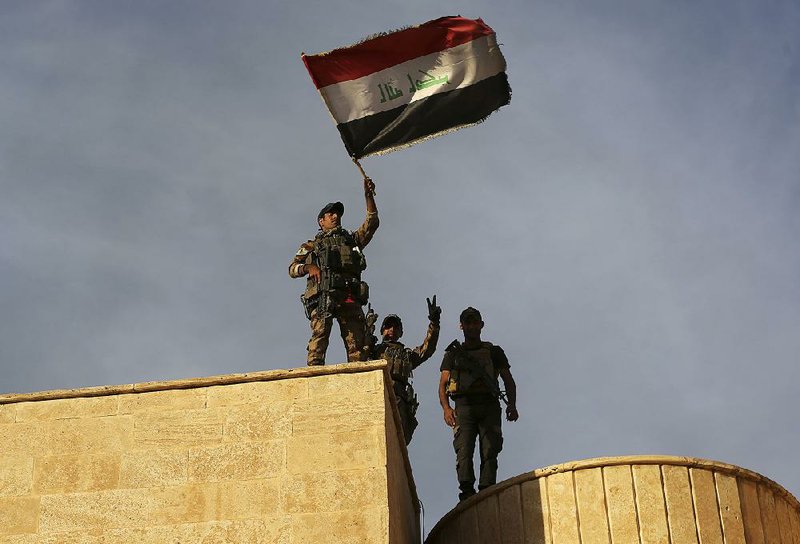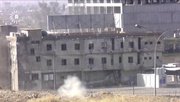KIRKUK, Iraq -- Islamic State militants launched a wave of pre-dawn attacks in and around the northern Iraqi city of Kirkuk on Friday, killing at least 14 people and setting off fierce clashes with Kurdish security forces that were still raging after sundown.
RELATED ARTICLE
http://www.arkansas…">Turkey nearing a Mosul role, U.S. says
The assault appeared aimed at diverting attention from the Iraqi offensive to retake Mosul and raised fears the extremists could lash out in unpredictable ways as they defend the largest city under their control in Iraq.
Multiple explosions rocked Kirkuk, and gunfire rang out around the provincial headquarters, where the fighting was concentrated. Smoke billowed over the city, and the streets were largely deserted out of fear of militant snipers. The Islamic State said its fighters targeted the provincial headquarters in a claim carried by its Aamaq news agency.
North of the city, three suicide bombers stormed a power plant in the town of Dibis, killing 13 workers, including four Iranian technicians, before blowing themselves up as police arrived, said Maj. Ahmed Kader Ali, the Dibis police chief.
Iran's Foreign Ministry spokesman, Bahram Ghasemi, condemned the assault, which he said also wounded three Iranian workers, according to the official Islamic Republic News Agency. It was not immediately clear whether Iranians were targeted in other attacks.
The Turkmeneli TV station, which had earlier shown live footage of smoke rising from outside the provincial headquarters, said in a news bulletin that one of its reporters, Ahmet Haceroglu, was killed by a sniper while covering the fighting.
There was no immediate word on casualties among other civilians or the Kurdish forces in Kirkuk. Police and hospital officials could not be reached for comment.
Kirkuk is some 100 miles from the Islamic State-held city of Mosul, where Iraqi forces launched a wide-scale offensive Monday. The Islamic State has in the past resorted to suicide bombings in and around Baghdad in response to battlefield losses elsewhere in the country.
Kirkuk is an oil-rich city claimed by both Iraq's central government and the largely autonomous Kurdish region. Kurdish forces assumed full control of the city in the summer of 2014 as Iraq's army and police crumbled in the face of a lightning advance by the Islamic State.
Kemal Kerkuki, a senior commander of Kurdish peshmerga forces west of Kirkuk, said the town outside the city where his base is located also came under attack early Friday, but that his forces repelled the assault.
He said the Islamic State maintains sleeper cells of militants in Kirkuk and surrounding villages. "We arrested one recently and he confessed," he said, adding that Friday's attackers may have posed as displaced civilians in order to infiltrate the city. Kirkuk province is home to hundreds of thousands of people displaced by the conflict.
Civilians grabbed their guns and joined the fight. One man, speaking to the local television channel Rudaw, seemed to relish the chance to fight the Islamic State.
"No matter how much ammo they have, we do not fear them," the man said.
Push toward Mosul
Iraqi and Kurdish forces backed by a U.S.-led coalition launched the multipronged assault this week to retake Mosul and surrounding areas -- the largest operation undertaken by the Iraqi military since the 2003 U.S.-led invasion.
By Thursday, the Iraqi forces had advanced as far as Bartella, a historically Christian town some 9 miles from Mosul's outskirts.
A reporter traveling Friday with the Iraqi special forces saw homes along Bartella's main road painted with Islamic State graffiti, including the first letter of a derogatory Arabic word for Christians, which the militants use to mark Christian property. Under Islamic State rule, Christians must convert to Islam or pay a special tax.
Islamic State graffiti was also sprayed on the inside walls of the town's church. Iraqi soldiers raised the national flag over the building and rang the church bell, signaling its liberation.
"Bartella was liberated yesterday, and today we are inside its church," Lt. Gen. Talib Shaghati declared. "I bring the good news to our Christian brothers that the church is liberated."
Elsewhere in Iraq, the country's top Shiite cleric called on forces taking part in the Mosul offensive to protect civilians, and for residents of Mosul, a mainly Sunni city, to cooperate with security forces.
"We stress today upon our beloved fighters, as we have before on many occasions, that they exercise the greatest degree of restraint in dealing with civilians stuck in the areas where there is fighting," the reclusive Grand Ayatollah Ali al-Sistani said in a Friday sermon read by an aide. "Protect them and prevent any harm to them by all possible means."
Some 3,900 people, or about 650 families, have fled Mosul and the nearby Hamdaniyah district since the operation began, according to Adrian Edwards of the U.N. refugee agency.
Ravina Shamdasani, of the U.N. human-rights office, said it had "verified information" that the Islamic State forced 550 people to relocate to Mosul from the nearby villages of Samalia and Najafia on Monday, part of an "apparent policy of preventing civilians from escaping to areas controlled by Iraqi security forces."
Shamdasani reiterated concerns the Islamic State could use civilians as human shields and said the office was investigating reports that the group had killed at least 40 civilians for suspected disloyalty. She did not provide further details.
U.S. air support
Iraqi and Kurdish forces have relied heavily on U.S.-led coalition jets as they have won back territory from the Islamic State.
But now some say they aren't getting what was promised.
Iraqi army commanders advancing from the southeast complain that they have been forgotten, while even counterterrorism troops, who work closely with the U.S.-led coalition, said air cover was disappointing on their first day in the fight.
A Kurdish security official, who spoke on the condition of anonymity because of the sensitivity of the topic, said the air support was "very limited" and that Kurdish forces had taken heavy casualties as a result when they opened a new front Thursday.
U.S. officials say they have large amounts of air power backing the push for the city, which started Monday, but there are more fronts to support than ever before in an operation against the militants. Tens of thousands of Iraqi troops are closing in on the city from the north, south and east, and coalition jets are also bombing militants across the border in Syria.
In previous offensives in Fallujah, Ramadi and Sinjar, Iraqi forces have become accustomed to close air support, with coalition jets clearing the way for their advance by flattening enemy artillery and mortar positions and eliminating car bombs that speed toward their lines. The heavy air backing has boosted the confidence of Iraqi and Kurdish forces but also has left them dependent on the help.
"Mosul is the largest operation conducted to date; there are a lot more targets, more axes of attack," said Col. John Dorrian, a spokesman for the U.S. military in Baghdad. "One of the immutable truths of air support is that there will always be more demand than supply."
The coalition is working with Kurdish and Iraqi forces to better "sequence" operations to resolve the issue, he said.
About 25 miles southeast of Mosul, on the front lines near the town of Gwer, there were steady complaints from soldiers from the 9th Armored Division of Iraq's army, which has been grinding north up the eastern bank of the Tigris River.
Across the radio in a Humvee touring the area came regular pleas for strikes. "American support is bad, bad, bad," said Sgt. Marwan Abbas.
In a temporary headquarters in the village of Kanhash, the division's commander, Lt. Gen. Qassim al-Maliki, choose his words carefully at first.
"There is support, but a lot of the time it's delayed," he said.
It is unclear how many aircraft from the United States and its coalition are dedicated to the fight in Mosul, but a senior defense official said the number was "significant."
Footage of the battle has shown an array of U.S. aircraft flying overhead, from B-52 bombers to Apache gunships.
A senior defense official, speaking on the condition of anonymity, said commanders are "aware of the concern."
"It's something we're talking to the [peshmerga] about to examine the situation to see what resources we do have and if there are opportunities to provide support in additional ways."
Col. Falah al-Obedi said coalition support "was not at the required level."
"It wasn't at the level of Fallujah, it wasn't the level of Beiji or Qayyarah," he said, listing previous offensives." They let us down."
Information for this article was contributed by Emad Matti, Adam Schreck, Susannah George, Ahmed Sami, Joseph Krauss, Bassem Mroue, Amir Vahdat, Qassim Abdul-Zahra and Jamey Keaten of The Associated Press; by Tim Arango, Omar al-Jawoshy, Falih Hassan, Nick Cumming-Bruce and staff members of The New York Times; and by Loveday Morris, Thomas Gibbons-Neff and Mustafa Salim of The Washington Post.
A Section on 10/22/2016



